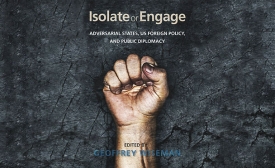syria

Professors Wiseman, English and Nguyen led a timely and engaging discussion about their book, "Isolate or Engage: Adversarial States, U.S. Foreign Policy, and Public Diplomacy."

Anti-extremism messaging isn't working. So why are governments reluctant to change tactics?
Several archaeological sites have been attacked by Islamic State jihadis in Iraq and Syria. […] “I think the growing awareness that hard power will not be enough to defeat violent extremism is gaining ground. We need also soft power,” [Irina] Bokova said. “Culture should be part of our response to violent extremism”.
The latest series of WikiLeaks cables have once again embarrassed the Saudi government and forced it on to the diplomatic defensive. The cables, over half a million documents said to have come from the Saudi Foreign Ministry, contain titillating details about how Riyadh operates — but no smoking guns related to nuclear enrichment or other issues of global fascination.
U.N.: A military defeat of the Islamic State in Syria and Iraq could scatter extremists around the globe. Would the world be a safer place if the United States and its allies were to defeat the Islamic State in Iraq and Syria? Not necessarily, according to a senior U.N. counterterrorism official. Extremist fighters have proven remarkably adept over the past three decades at transforming themselves at the close of battles.

Tehran faces a classic case of mission creep: It is being forced to commit ever-greater military and financial resources in Syria, falling deeper into the Syrian quagmire with no clear exit strategy. After four years of war, Assad’s forces are overstretched, the regime’s Alawite base is demoralized, and the Syrian economy is in a free-fall.







